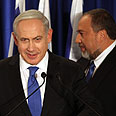

Opposition within the Likud to the ticket merger with Yisrael Beiteinu is mounting ahead of the party's vote on the move, Monday.
Ynet and Yedioth Ahronoth learned Sunday that as part of the deal struck between Prime Minister Benjamin Netanyahu and Yisrael Beiteinu Chairman Avigdor Lieberman, they will be able to weigh in on the composition of the joint list running for the Knesset.
Related stories:
- Merez: Lieberman is the Israeli Putin Lieberman: Time for new political reality
- Op-ed: Pressure overcame ego
Any such changes would be made despite the fact that the parties' respective lists will be determined by the Likud primaries and Yisrael Beiteinu's election committee.
The Likud primaries have been set for November 25, and once the list is determined, Netanyahu will "improve" it, to include his preferred candidates – who will also need to be approved by Lieberman.

Netanyahu and Lieberman (Photo: Gil Yohanan)
That means that if one of the candidates that Netanyahu would like to see elected to the Knesset fails to make the cut in the primaries, he would be able to improve his chances using one of the top slots reserved for Yisrael Beiteinu.
A Likud source said that the PM planned to release a list of "recommended members" ahead of the primaries.
"Netanyahu is thinking about what's best for him, not what's best for the Likud," a senior party member said. "He wants to make sure that he becomes prime minister… We're going into this election with 42 mandates, but we have no idea how many we'll have in the end."
He added that one of the fears expressed by party insiders was that the Left and Center blocs would benefit from the merger, as disappointed voters may transfer their ballots to them.
Ulterior motives?
Netanyahu's decision to align with Lieberman for the elections has met fierce opposition by both ministers and Likud activists.
Over the weekend, internal tensions mounted between those in the party that demand an open vote on the move, and those who prefer an anonymous vote.
- For full coverage of the elections click here
Netanyahu and others supporting the move demand an open vote, while those opposing it, led by Minister Michael Eitan, demand an anonymous vote.
Eitan argued over the weekend that party members should not be asked to vote on the deal before all of its details have been presented to them. "How can Likud members be expected to sign off on a deal they know nothing about?" he wondered.
Deputy PM and Minister of Intelligence Services Dan Meridor spoke against the move over the weekend: "This is a bad move. This is no longer the Likud."
Meridor is rumored to be mulling his future in the party should the merger be approved.
Likud Secretary-General Gadi Arieli is said to be gearing for the possibility that the party's caucus will end up holding two votes.
Netanyahu is said to be aware of the opposition within the Likud, and has had the initiative's supporters launch a "phone blitz" meant to rally support for it.
Party insiders said it was also possible that Netanyahu would not attend the caucus on Monday, but his associates said that "the event is on the books."
Meanwhile, Ynet and Yedioth Ahronoth learned that the architect of the merger which sent shockwaves through Israel's political arena was Arthur Finkelstein, who over the years has been a close advisor of Lieberman's.
Finkelstein also advised Netanyahu in the past.
In the months prior to the announcement, the New York-based consultant reportedly presented Netanyahu and Lieberman with data suggesting that a merger would allow both parties to conserve their power base and possibly even expand it.
Tzvika Brot and Akiva Novick contributed to this report
Yuval Karni is a Ynet and Yedioth Ahronoth correspondent
- Receive Ynetnews updates
directly to your desktop















